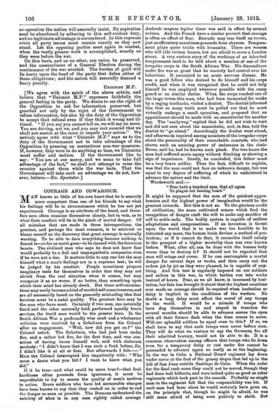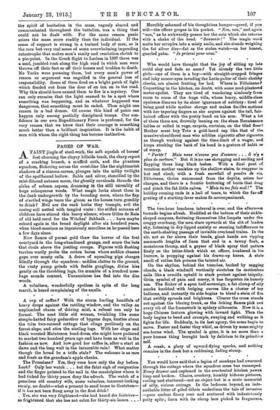COURAGE AND COWARDICE.
MAN knows so little of his own heart that he is scarcely more competent than one of his friends to say what his feelings will be in circumstances which he has not yet experienced. Courage is an attribute of the heart, and there- fore men often examine themselves closely, but in vain, as to what their conduct will be in the pinch of mortal danger. Of all mistakes that are made in these introspeetions, the greatest, and perhaps the most common, is to mistrust or blame oneself on the discovery that great courage is naturally wanting. To be able to dare everything because nothing is feared is—so far as merit goes—to be classed with the ferocious beasts. The civilized man who says he does not know fear would probably be a dull and unsympathetic companion even if he were not a liar. It matters little to any one but the man himself what a man's feelings are in a supreme test ; he will be judged by his conduct. People sometimes propose imaginary tests for themselves in order that they may not shrink from the real situation when it comes, but may recognize it as no worse, if no better, than something upon which their mind has already dwelt. But these self-examina- tions may easily become a kind of morbid self-coned° usness, and are all necessarily based on the generally misleading idea that heroism must be a natal quality. The greatest hero may be the man who fears most. Certainly if two men, one naturally timid and the other naturally bold, performed equally brave services, the timid man would be the greater hero. In the South African War a profoundly wise snub and a wholesome criticism were received by a Subaltern from his Colonel after an engagement. "Well, bow did you get on P" the Colonel asked. The Subaltern, who had just been under fire, and a rather hot fire, for the first time, and was con- scious of having borne himself well, said with elaborate modesty: "I didn't know that I was such a funk before, Sir.
I didn't like it at all at first. But afterwards I " Here the Colonel interrupted him impatiently with: "Who cares a damn what you felt P I want to know what you did."
If it be true—and what could be more true P—that fool- hardiness often proceeds from ignorance, it must be unprofitable to try to assess the quality of men's motives in action. Brave soldiers who have led memorable charges have been known to say that they rushed on in order to end the danger as soon as possible. The Romans understood the subtlety of what is in any case rightly called courage Audendo ntagnus tegitur tintor was said in effect by several writers. And the French have a similar proverb that courage is often an effect of fear. Bravado may rear itself on terror, just as effrontery sometimes proceeds from shyness. Tempera.. went plays queer tricks with humanity. There are women who will ride vicious horses, but are afraid to cross a London street. A very curious story of the workings of an inherited temperament used to be told about a member of one of the irregular corps in the South African War. His discomfiture under fire was so great that he scarcely had control over his behaviour. It amounted to an acute nervous disease. He was a good fellow who desired to do himself and his corps credit, and when it was recognized that he could not help himself he was employed whenever possible with the camp guard or on similar duties. When the corps reached one of the large towns this man, who had been tormented for weeks by a raging toothache, visited a dentist. The dentist informed him that so many teeth must be pulled out that he must virtually undergo a small operation, and proposed that an appointment should be made with an anaesthetist for another day. The " scallywag " replied that he did not wish to wait and did not care about the anaesthetic, and, in fine, told the dentist to "go ahead." Accordingly the dentist went ahead, and afterwards inquired among members of the irregular corps about the personality of their remarkable comrade, who had shown such an amazing power of endurance in the chair. Never, said he, had he known such pluck. For two hours the man had suffered acute agony without flinching or showing a sign of impatience. Surely, be concluded, this fellow must be a very brave soldier. Thus the fact, difficult to explain, was that the man could not face an unknown danger, but was equal to any degree of suffering of which he understood in advance the nature and the limit.
Wordsworth said
" Fear bath a hundred eyes, that all agree
To plague her beating heart."
It might be supposed that the men of the quickest appre- hension and the highest power of imagination would be the greatest cowards. But this is not so. To the glorious credit of civilization, the same cultivated senses which feed the recognition of danger exalt the will to make any sacrifice of self to noble ends. The bodily system is capable of endless adaptations and compensations. If an invention is thrust upon the world that is to make war too horrible to be tolerated any more, the human brain devises a method of pro- tection; or if it cannot do that, it reconciles itself calmly to the prospect of a higher mortality than was eve• known before. What, after all, can be done with the human body worse than to destroy it P It should not be expected that man will cringe and cower. If he can contemplate a mortal danger for several days or weeks, and then carry out the orders jot by jot as they were planned, he is capable of any- thing. And this test is regularly imposed on our soldiers and sailors in this war, in which battles run into weeks instead of hours. Fear, as we all know, is increased by hesi- tation, but fate has brought it about that the highest exactions ever made on courage should be required when hesitation or delay is implicit in the conditions of the warfare. No doubt a long delay must affect the moral of any troops in the world. It would be a miracle it troops who have dug themselves in and stayed in trenches for several months should be able to advance across the open with all their former dash when the time comes to move. Will our splendid soldiers be equal even to this P If so, we shall have to say that such troops were never before seen. They will do what we venture to say the Germane, for all their admitted bravery, would not be able to do. It is a common observation among officers that troops who lie down even for a temporary delay or rest under fire cannot be persuaded to advance again so easily as at the beginning. In the war in Cuba a National Guard regiment lay down under cover at the foot of the grassy slopes that led up to the hill of San Juan outside Santiago de Cuba. When the order for the final rash came they could not be moved, though they had done well hitherto, and were indeed quite as good as other regiments which took part in the assault. Probably no single man in the regiment felt that the responsibility was his. If each man bad been alone he would certainly have gone on, on the principle that, though he might be afraid, be was still more afraid of being seen publicly to shirk. But
the spirit of hesitation in the mass, vaguely shared and communicated throughout the battalion, was a thing that could not be dealt with. For the same reason panic seizes the mass more readily than the individuaL If the sense of support is strong in a trained body of men, so is the rare but very real sense of some overwhelming impending catastrophe that makes men's sanity and resolution shrink to a pin-point. In the Greek flight to Larissa in 1897 there was a mad, jumbled rush along the high road in which men were thrown off their feet or off their horses and trodden to death. No Turks were pursuing them, but every man's power of reason or argument was engulfed in the general lose of responsibility. Some of them fired on a bright patch of light which flooded out from the door of an inn on to the road. Why this should have caused them to fire is a mystery. One can only surmise that the light seemed to be a spot where something was happening, and as whatever happened was dangerous, that something must be ended. Thus might one reason in a bad dream. Of course this kind of panic can happen only among partially disciplined troops. Our con- fidence in our own Expeditionary Force is profound, for the very reason that we know that their courage is something much better than a brilliant inspiration. It is the habit of men with whom the right thing has become instinctive.



































 Previous page
Previous page